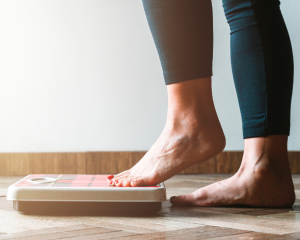One of the reasons traditional weight loss ‘dieting’ doesn’t work is that you feel deprived and hungry, and when you stop dieting the weight goes straight back on because let’s face it, you can’t stay on a diet forever!
When trying to lose weight, the goal should be Satiety. The science behind Satiety will help you never, ever feel deprived again. It’s one of the keys to healthy sustainable weight loss and simply it means feeling satisfied and gratified but not overly full after a meal.
Satiety is feeling full and fully satisfied after a meal and staying satisfied until your next meal – without snacking, munching and mindless eating.

Satiety is a key component of successful, healthy and sustainable weight loss.
Satiety is determined by two things: how fast or slow you eat, and what you eat.
Its important to know your hormones with satiety and feeling hungry:
Ghrelin – a hormone your stomach and upper GI tract (via the hypothalamus) to produce a voracious appetite and food seeking behaviour. Ghrelin increases in response to starvation (and dieting) and decreases after eating.
GLP – 1 – Glucagon-like peptide -1 is a hormone released by the small bowel when food is being digested. It acts (via the hypothalamus) to increase satiety and is part of the signal to stop eating. It also acts to improve efficiency of insulin.
Leptin – A hormone produced by fat cells. Leptin acts as the ‘master regulator’ of body weight. When fat accumulates, leptin levels rise. This signals to the hypothalamus that enough energy is stored, rusting in an increase in metabolism and decreased appetite. When there is less fat, leptin levels fall, resulting in the hypothalamus increasing appetite and decreasing metabolism.
Peptide – YY (PYY) – A hormone originating in the small intestine that is released after food is sensed in within the bowel. It also acts on the hypothalamus to promote feelings of satiety, fullness and forms part of the signal to stop eating.
There are two type of satiety – one is short term and the other is long term, meaning you’ll still be full 4-6 hours from now, when you should be hungry again.
If you are snooping around the kitchen cupboards sooner than four hours after you have finished a meal, then you are eating the wrong foods or the wrong amounts of the right foods.
Its usually the wrong amounts of the wrong foods!

Learn to listen to your body – nobody knows your body like you do.
So how can I increase my Satiety?
- Learn to listen to your body – Nobody knows your body like you do.
- Stop eating because you are pleasantly full (80%) not eating until everyone else at the table has or you need to completely clean your plate.
- Don’t listen to old ingrained habits – Use the techniques we discussed to install new habits to create healthier eating habits.
- Satiety isn’t just about feeling full – its about true satisfaction or feeling pleasantly full with genuinely delicious food.

What you need to know about testing vitamin D
Did you know, that during the winter, however much the sun shines, you are simply not going to absorb any vitamin D. So it’s really

Everything you need to know about my transformational weight loss programme
Transformational weight loss programme – 12 weeks You can’t just embark on a new diet plan without also taking care of your relationship with food,

What does ‘gut health’ actually mean?
Did you know that 90% of disease can be linked back to gut health? Over the years I have seen numerous clients for all different

Once you pop, you can’t stop – why Pringles are so addictive
Why is it? Once you pop, you can’t stop! Remember this advertising slogan? Can you relate to it? Why is it when we start to

How can I manage a metabolic condition?
How can I manage, and improve my metabolic condition? Whether you have had an official diagnosis or not, you could be on your way to

What is metabolic syndrome and how can it be treated
What is Metabolic Syndrome? Metabolic syndrome is a combination of metabolic dysfunctions in the body which can be; obesity, fat around the middle, type 2



